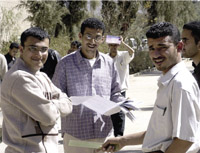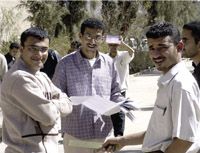
Cheating is a grave problem at government universities, officials say [Archives:2008/1123/Reportage]
January 24 2008
 |
hamed_thabit@hotmail.com.
Cheating and corruption has become normal in government universities in Yemen, whereas they should be places creating and shaping the character of honest, sincere, hardworking men and women with clear consciences to serve their country. A report by Hamed Thabet. The reporter can be reached by hamed_thabit@hotmail.com.
Many students at government universities – even at Sana'a University – pass exams by cheating and using different tricks, quite frequently graduating with high marks. Additionally, anyone may cheat at Sana'a University without facing any problems, especially women.
Supervisors are facilitators
According to Hamid Al-Madhaji, director of admissions and registration, “Exam halls are small and overcrowded, with as many as 50 to 60 students, which helps students cheat easily. Most students prefer to sit in the back of class in order to cheat more freely and easily. Additionally, many exam proctors who aren't university staff are insincere and dishonest, so they help students cheat.”
He adds, “Students bribe proctors with money or sometimes a bag of qat in order to let them cheat and this works because their salaries are low and insufficient. Very often, there are only two or three proctors for more than 50 students, which makes monitoring difficult.”
According to Al-Madhaji, some citizens register to oversee university exams because they need extra cash, but really do so because they have friends or relatives studying there. In this case, they are just there to facilitate the cheating process.
One anonymous proctor who used to oversee exams at Sana'a University's Faculty of Commerce every semester maintains, “As long as there's no scandal, I think it's fine to let students cheat on their exams. I think many professors put difficult questions on their exams so students will fail, so I must help them by allowing them to cheat so they'll pass.”
Some students even threaten proctors, telling them they'll be in trouble or be beaten if they don't allow cheating. One former proctor who now has stopped supervising exams admits, “Many students from powerful tribes are dangerous, threatening, 'If you don't let us cheat, you'll be in danger!' Thus, I had no choice but to let them cheat.”
Methods
Students use various tricks and means to cheat. As Al-Madhaji notes, “Women are really good at this, using the speaker on their mobile phone to ask their friends outside the class to give them the answers they need. No one notices this because their faces are covered.”
A source at Sana'a University indicates, “Every semester, exam proctors in the Faculty of Commerce catch 25 to 30 young women cheating with their phones. Undoubtedly, many haven't been caught yet because some proctors don't do their job well and thus, allow this to happen.”
One such anonymous senior at Sana'a University's Faculty of Commerce says with satisfaction, “I always enter exams with my mobile phone while my friend waits outside with the book. Then, in a low voice, I ask her the questions and she gives me the right answers. Many girls regularly do the same and no one can catch us. Only a few get caught because they are nervous or talk too loudly.”
She continues, “Sometimes I – and other girls as well – enter the exam room with the mobile phone and then wait an hour or two until the other students – particularly the smart ones – finish and leave. Then, my friend who is outside takes the exam question sheet from them with their answers written on it and calls us with the correct ones.”
Another trick involves female juniors and seniors taking exams for freshmen by giving the exam supervisor their freshman friend's identity card.
According to Al-Madhaji, “We know many young women take exams for their friends, but we can't say anything because they are veiled. In Yemeni society, veiled women can't be forced to show their face, so young women are exploiting this weakness to their advantage.” Because there's no serious scrutiny before exams, both male and female students alike sometimes gain admittance to exam halls with forged university identity cards or those belonging to their friends or relatives in order to take exams for them by attaching their real photo to the card, despite the fact that the card bears a different name.
Al-Madhaji notes, “So far this year, I've seized eight students at the Faculty of Commerce with forged identity cards. The university still is investigating to learn how they obtained them and who helped them.”
Because they are locals hired from outside the university, exam proctors aren't qualified for such a task and even if they do realize that an identity card is for someone else, they are content to keep quiet for as little as YR 500. Very few proctors actually are honest and willing to hand over such students to officials to handle the problem.
During exams, some students write their answers on the exam question sheet itself [Yemeni universities allow students to keep their test sheets rather than turning them in upon completion of the exam] under the pretext that they want to review the answers they gave after the exam; however, the truth is that they then give their answers to their friends, sometimes with the help of the exam proctor, who will act as a courier, if paid some money.
Writing on rulers and small papers or “cheat sheets” – called barashim in Arabic – also is normal in exams, while another method of cheating involves students writing answers on their desks or chairs. As one student maintains, “There's no law or system in the universities, so you can do whatever you want because it's too crowded. Because the desks aren't checked, before an exam, I write on it answers to questions I expect to be on the exam. Even if a proctor does see it and ask, 'What's this?' a very simple reply is, “It's not mine. Maybe other students before me wrote it.'”
A graduate of Sana'a University's Faculty of Arts describes, “I used to bring some money with me to exams. Before it commenced, I'd go to the proctor and convince him or her to let me cheat by giving him or her some money, like YR 300 to YR 500. Most of the time, it worked, but some proctors were so rude and impudent that they couldn't be bribed!”
When asked why they accept money from students to allow them to cheat, one exam proctor replied, “Here at the university, they expect us to work without good pay and they don't pay us on time. I'm a poor man with three children, so without good pay and with rising costs, I think it's ok to take money from students to let them cheat. I don't consider it a bribe, but rather as a way of helping my fellow brothers and sisters.
Expressing concern about this grave situation, one Sana'a University official comments, “We're looking forward to resolving this problem by providing more and larger exam halls, in addition to hiring trustworthy exam proctors to monitor students.”
However, he notes, “Many programs and plans remain on paper for now. Due to shortfalls in the university's budget, only a few have been carried out because all can't be done at the same time. It's only a matter of time and then things will be fine,” he observes, adding that, “One step toward wiping out corruption is providing good pay.”
——
[archive-e:1123-v:15-y:2008-d:2008-01-24-p:report]


